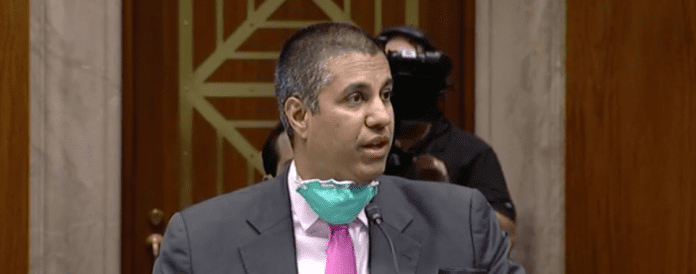Before a Senate subcommittee, Federal Communications Commission Chairman Ajit Pai argued that American 5G leadership and expedited 5G mid-band deployments are worth the $9.7 billion in incentive payments that the agency plans to pay in order to get C-Band spectrum cleared rapidly.
At last week’s oversight hearing of the FCC for fiscal year 2021 before a Senate appropriations subcommittee, Pai faced significant skepticism of the FCC’s plan to spend between $3-$5 billion for satellite relocation costs and an additional $9.7 billion in incentive payments to get the major satellite users of the C-Band spectrum (3.7-4.2 GHz) to move operations out of the lower part of the band on an expedited timeline, so that spectrum can be repurposed for terrestrial mobile 5G service.
Without the expedited clearing, Pai explained, the relocation would stretch until December 2025; but the clearing program, which the major satellite operators have all opted into, will ensure that 180 megahertz of the C-Band is cleared by late 2021.
Senator John Kennedy (R-Louisiana), chairman of the subcommittee, noted that he was a proponent of a public auction of the C-Band spectrum, but took issue with the approximately $15 billion in various payments to foreign-owned satellite companies, as did other members of the subcommittee.
“Tell us why this is worth it,” said Senator Jeffrey Moran (R-Kansas). “Why does a couple of years matter? What do we get for that?”
Three things, Pai responded: Delivering 5G services to American consumers “years before they otherwise could be delivered”; American leadership in 5G; and an “innovation economy on our shores.”
Pai said that he sees American global leadership in 5G to be as important as delivering 5G services to consumers. He referenced a recent media coverage of China’s $1.4 trillion plan to overtake the U.S. in technology leadership.
“They want to seize the mantle of 5G leadership for themselves, because they believe — rightfully, in my view — that America derives significant benefits from being the first mover in 5G,” Pai said. “If we delay the C-Band for two years or four years or however many years, that ultimately delays the delivery of mid-band spectrum that allows entrepreneurs and innovators to use that.” A delay, he argued, plays into whether those players choose to work in the U.S. or elsewhere and therefore, the extent to which the U.S. economy benefits from 5G.
“Capital is fickle. Talent is fickle,” Pai said. “The longer the FCC delays the introduction of this spectrum for innovators to use, the more likely it is that other countries, other regions, will seize that talent and capital for themselves. I don’t want that to happen, and I think it’s not just a wireless priority, I think it’s a national security priority for us, to make the innovation economy continue to thrive in America.”
Asked about how much the C-Band auction might put back into U.S. federal coffers after costs, Pai said that there has been speculation that because mid-band spectrum is so prized for 5G, that the auction could raise tens of billions of dollars in revenue for the U.S. Treasury even after relocation costs and incentive payments.

